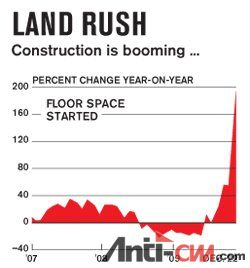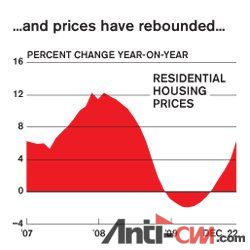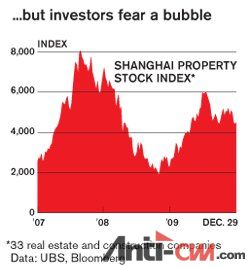|
【中文标题】大陆上的狂热 【原文标题】Mania in mainland 【登载媒体】BusinessWeek 【来源地址】http://www.businessweek.com/magazine/content/10_02/b4162030091917.htm 【翻译方式】人工 【声明】本翻译供Anti-CNN使用,未经AC或译者许可,不得转载。 【原文库链接】http://bbs.m4.cn/thread-215373-1-1.html 【译文】
Mania on the Mainland
Think the U.S. real estate bubble was bad? China's could be worse.
大陆上的狂热
认为美国的房地产泡沫严重?中国的可能更严重。



配图说明:建筑迅猛发展,楼价也已反弹,但投资者担心泡沫……
By Dexter Roberts
Beijing - Li Nan has real estate fever. A 27-year-old steel trader at China Minmetals, a state-owned commodities company, Li lives with his parents in a cramped 700-sq.-ft. apartment in west Beijing. Li originally planned to buy his own place when he got married, but after watching Beijing real estate prices soar, he has been spending all his free time searching for an apartment. If he finds the right place—preferably a two-bedroom in the historic Dongcheng quarter, near the city center—he hopes to buy immediately. Act now, he figures, or live with Mom and Dad forever. In the last 12 months such apartments have doubled or tripled in price, to about $400 per square foot. "This year they'll be even higher," says Li.
北京电——Li Nan 对房地产很狂热。他27岁,是国有中国五矿集团公司的钢材贸易专员,和父母一起住在北京西部700平方公尺的小房子里。Li原本打算结婚的时候再买自己的房子,但是看到北京房地产价格一路飙升,他就把所有空余时间都用来找房子。如果找到合适的地方——最好有两个卧室,位于历史悠久的东城区、靠近市中心——他希望马上就买。他认为,要么现在买,否则就永远和爸妈住在一起。过去12个月这样的房子价格涨到了原来的两倍或三倍,大约每平方公尺400美元。“今年甚至会更高,”Li说。
Millions of Chinese are pursuing property with a zeal once typical of house-happy Americans. Some Chinese are plunking down wads of cash for homes: Others are taking out mortgages at record levels. Developers are snapping up land for luxury high-rises and villas, and the banks are eagerly funding them. Some local officials are even building towns from scratch in the desert, certain that demand won't flag. And if families can swing it, they buy two apartments—one to live in, one to flip when prices jump further.
几百万中国人狂热的追求不动产,这种热情曾经是喜欢房子的美国人的特征。一些中国人为住宅砸下大量现金,其他人则创纪录的办理抵押贷款。开发商抢购土地,用于奢华的高层和别墅,而银行热切地为他们提供资金。一些地方官员甚至正在不毛之地建造城镇,确信需求不会减退。如果家庭做得到,他们会购买两套房子,一套自住,一套等房价涨了出售。
And jump they have. In Shanghai, prices for high-end real estate were up 54% through September, to $500 per square foot. In November alone, housing prices in 70 major cities rose 5.7%, while housing starts nationwide rose a staggering 194%.
房价确实涨了。在上海,高端房地产的价格9月份上升了54%,达到了每平方英尺500美元。仅11月70个主要城市的房价就上涨了5.7%,而全国的住房开工率难以置信地上升了194%.
The real estate rush is fueling fears of a bubble that could burst later in 2010, devastating homeowners, banks, developers, stock markets, and local governments. "Once the bubble pops, our economic growth will stop," warns Yi Xianrong, a researcher at the Chinese Academy of Social Sciences' Finance Research Center. On Dec. 27, China Premier Wen Jiabao told news agency Xinhua that "property prices have risen too quickly." He pledged a crackdown on speculators.
房地产热引发了关于2010年泡沫可能破灭的恐惧,泡沫破灭将会摧毁房产所有者、银行、开发商、股市和地方政府。“一旦泡沫破灭,我们的经济增长就会停止,”中国社科院金融研究中心研究员易宪容警告说。12月27日,中国总理温家宝告诉新华社,“房价上涨太快了。”他发誓要打击投机商。
UNAFFORDABLE PRICES
负担不起的价格
Despite parallels with other bubble markets, the China bubble is not quite so easy to understand. In some places, demand for upper middle class housing is so hot it can't be satisfied. In others, speculators keep driving up prices for land, luxury apartments, and villas even though local rents are actually dropping because tenants are scarce. What's clear is that the bubble is inflating at the rich end, while little low-cost housing gets built for middle and low-income Chinese. In Beijing's Chaoyang district—which represents a third of all residential property deals in the capital—homes now sell for an average of nearly $300 per square foot. That means a typical 1,000-sq.-ft. apartment costs about 80 times the average annual income of the city's residents. Koyo Ozeki, an analyst at U.S. investment manager Pimco, estimates that only 10% of residential sales in China are for the mass market. Developers find the margins in high-end housing much fatter than returns from building ordinary homes.
即使与其他泡沫市场相比较,中国泡沫也不是很容易理解。在一些地方,上层中产阶级对房子的需求很大,无法满足。在另一些地方,投机商拉高土地、豪华公寓和别墅的价格,即使租金事实上在下降,因为租客很少。很清楚的是,在富裕者这端泡沫压力正在增大,却很少有提供给中产或低收入者的廉价房被建造。在北京朝阳区——这里占首都住宅成交量的三分之一——住宅平均售价每平方英尺300美元。这意味着一套普通的1000平方英尺房子的花费是这个城市居民人均年收入的80倍。据美国投资经理Pimco的一名分析师Koyo Ozeki估计,中国只有10%的住宅销售面向大众市场。开发商发现高端房产的盈利远大于普通住宅的回报。
How did this bubble get going? Low interest rates, official encouragement of bank lending, and then Beijing's half-trillion-dollar stimulus plan all made funds readily available. City and provincial governments have been gladly cooperating with developers: Economists estimate that half of all local government revenue comes from selling state-owned land. Chinese consumers, fearing inflation will return and outstrip the tiny interest they earn on their savings, have pursued property ever more aggressively.
这个泡沫正如何发展?低利率,官方鼓励银行借贷,以及随后北京的5万亿美元刺激计划都使得资金充足。省市政府一直开心的和开发商合作:经济学家预测半数地方政府收入来自国有土地的出售。因为害怕会再次通货膨胀,吞噬他们微薄的存款利息,中国消费者更加激烈的追求不动产。
Companies in the chemical, steel, textile, and shoe industries have started up property divisions too: The chance of a quick return is much higher than in their primary business. "When you sit down with a table of businessmen, the story is usually how they got lucky from a piece of land," says Andy Xie, an independent economist who once worked in Hong Kong as Morgan Stanley's (MS) top Asia analyst. "No one talks about their factories making money these days."
化学药品、钢铁、纺织和鞋类业界也开始进军房地产:快速得到回报的机会比他们的主业更高。“当你和一桌子商人坐在一起,故事总是他们怎么通过一片土地开始发财,”曾经作为Morgan Stanley's (MS)的首席分析师在香港工作的独立经济学家,Andy Xie说。“这些天没有人谈他们的的工厂赚钱的事。”
HOMES BUILT ON SAND
建在沙滩上的房子
Newly wealthy towns are playing the game with a vengeance. Ordos is a city of 1.3 million in China's Inner Mongolia region. It has gotten rich from the discovery of a big coal seam nearby. An emerging generation of tycoons, developers, and local officials will go to any length to invent a modern Ordos. So 16 miles from the old town, a new civic center is emerging from the desert that could easily pass for the capital of a midsize country. An enormous complex houses City Hall and the local Communist Party headquarters, each 11 stories tall with sweeping circular driveways. Nearby loom a fortress-like opera house and a slate-gray, modernist public library. Thousands of villas and apartment towers stretch into the distance, all built by local developers in the hope that Ordos' recently prosperous will buy the places to be near the new center of power. Workers get bused daily to the new city hall, but the housing is still largely unoccupied. "Why would anyone go there?" asks Zhao Hailin, a street artist in the old town. "It's a city of empty buildings." (Ordos officials would not comment for this story.)
新的富有的城镇正将这个游戏玩到极致。位于中国内蒙古地区的鄂尔多斯是一个有130万人口的城市,因为附近发现大型煤层而变得富有。新生的企业大亨、开发商和地方官员会不顾一切的创造一个现代的鄂尔多斯。所以在距旧城16英里之外,一个很容易被误认为是一个中等大小国家的首都的全新的市政中心出现在沙漠里。一个庞大的建筑群包含了市政厅和地方党部,都有11层高,环绕着宽阔的车道。附近则是堡垒一般的歌剧院和石板灰的现代派风格的公共图书馆。数以千计的别墅和公寓一直延伸到远方,当地开发商建造它们时希望鄂尔多斯的新贵们会购买以靠近新权力中心。工人每天搭巴士到达新的市政厅,但是住宅仍然大部分空置。“为什么有人去那里呢?”旧城的街头艺术家Zhao Hailin问道。“那是由空房组成的城市。”(鄂尔多斯官方不会对这个故事发表评论。)
The central government now faces two dangers. One is the anger of ordinary Chinese. In a recent survey by the People's Bank of China, two-thirds of respondents said real estate prices were too high. A serial drama with the ironic name The Romance of Housing, featuring the travails of families unable to afford apartments, was one of the most popular shows on Beijing Television until broadcasting authorities pulled it off the airwaves in November. The official reason was that the show was too racy (one woman got an apartment by becoming the mistress of a corrupt local official), but online chat rooms speculated that the show was cut because it was upsetting to people unable to afford apartments.
中央政府现在面临两个危险。一个是普通中国人的愤怒。中国人民银行近期进行的调查里,三分之二的受访者说房价太高了。一部名为《蜗居》的电视剧描述了买不起房子的家庭的辛酸,这是北京电视上最受欢迎的节目之一,直到11月广电当局禁止其播放。官方理由是这个节目太过低俗(一个女人通过给腐败地方官员做情妇得到房子),但是网络聊天室推测这节目被砍是因为令买不起房的人苦恼。
The debate has become even more charged following injuries and deaths related to real estate. A woman from Chengdu committed suicide by torching herself when her former husband's three-story factory and attached living space were demolished to make way for a new road. A man in Beijing suffered severe burns in a similar protest over his home. In early December five professors at Peking University wrote to the National People's Congress calling for changes to a land seizure and demolition law and accusing developers of usurping the government's role when taking land for construction. The law is leading to "mass incidents" and "extreme events," the professors warned.
随着与房子有关的伤害和死亡的发生,争论变得更加激烈。当前夫的三层楼工厂和附属居住空间被摧毁,好为新的道路腾出空间时,来自成都的妇女实施了自焚。北京一名男子在类似的针对自己房子的抗议中被严重灼伤。12月初,北京大学的五位教授给全国人大写信,呼吁改变拆迁法,同时谴责开发商在征地建设中抢占政府角色。拆迁法导致了“群体事件”和“极端事件”,教授们警告说。
The second danger is that Beijing will try, and fail, to let the air out of the bubble. Pulling off a soft landing means slowly calming the markets, stabilizing prices, and building more affordable housing. To discourage speculation, the State Council, China's cabinet, is extending, from two years to five, the period during which a tax is levied on the resale of apartments. Tighter rules on mortgages may follow. Beijing also plans to build apartments for 15 million poor families.
第二个危险是北京将尝试消除泡沫并失败。成功软着陆意味着慢慢使市场回冷,平抑价格,建造更多便宜的房子。为了阻止投机,国务院,中国的内阁,将二手房交易的征税期从两年增加到了五年。更严格的抵押借贷规则可能随后会出台。北京还计划为1500万贫困家庭建房子。
KEY TO GROWTH
增长的关键
The government is reluctant to crack down too hard because construction, steel, cement, furniture, and other sectors are directly tied to growth in real estate; in November, for example, retail sales of furniture and construction materials jumped more than 40%. At the December Central Economic Work Conference, an annual policy-setting confab, officials said real estate would continue to be a key driver of growth.
政府不太愿意压制得太厉害,因为房地产相关的建筑、钢铁、水泥、家具以及其它方面都和增长直接联系;比如11月,家具和建筑材料零的售额暴涨超过40%。12月的中央经济工作会议——一个年度政策制定会议上,官员们说房地产将是增长的持续动力。
The worst scenario is that the central authorities let the party go on too long, then suddenly ramp up interest rates to stop the inflationary spiral. Without cheap credit, developers won't be able to refinance their loans, consumers will no longer take out mortgages, local banks' property portfolios will sour, and industrial companies that relied on real estate for a chunk of profits will suffer. It's not encouraging that the Chinese have been ham-handed about stopping previous real estate frenzies. In the 1990s the government brutally ended a bubble in Shanghai and Beijing by cutting off credit to developers and hiking rates sharply. The measures worked, but property prices plunged and economic growth slowed.
最坏的情况是中央机构让这场狂欢进行得太久,然后突然增加利率以停止不断增加的通货膨胀。没有低息贷款,开发商将不能重新为他们的贷款提供资金,消费者将不再获得抵押贷款,地方银行的资产目录会变得糟糕,依赖房地产丰厚利润的工业公司日子会不好过。中国人在停止以前的地产热上一直很笨拙,并不令人振奋。在上世纪90年代,政府突然的切断给开发商的贷款、提升利率,粗暴的终止了上海和北京的泡沫。这法子管用,但是使地产价格跳水,经济增长放缓。
Analysts are divided over the probabilities of such a crash, but even real estate executives are getting nervous. Wang Shi, chairman of top developer Vanke, has warned repeatedly in recent weeks about the risk of a bubble. In his most recent comments he expressed fear that the bubble might spread far beyond Beijing, Shanghai, and Shenzhen.
对这种崩溃的可能分析师们意见不一,但是甚至房地产主管们也变得紧张。顶级开发商万科的主席王石在最近几周反复警告泡沫的风险。在他最近的评论里他表达了对泡沫可能不止存在于北京、上海和深圳的恐惧。
PROFIT VS. SOUL
利润VS道义
One difficulty in handicapping the likelihood of a nasty pullback is the opacity of the data. As long as property prices stay high, the balance sheets of the developers look strong. And no one knows for sure how much of the more than $1.3 trillion in last year's bank loans funded real estate ventures. Analysts figure a substantial portion of that sum went into property, much of it indirectly. Banks often lend to state-owned companies for industrial purposes. But the state companies can then divert the funds to their own real estate businesses—or relend the money to an outside developer. Meanwhile, the big banks may be cutting back on their real estate risk by selling loans to smaller local banks and credit co-ops.
阻止可能的严重退步的一个难点在于数据的不透明。只要地产价格持续走高,开发商的资产负债表看起来就强。没人能确切知道去年超过1.3万亿的银行贷款中有多少提供给了房地产冒险。分析师估计有相当一部分资金进入了房产,其中有许多是间接进入。银行通常把钱贷给国有公司作为工业用途。但是国有公司能将资金转移到他们自己的房地产交易——或是将钱转借给外面的开发商。同时,大银行可以通过将贷款卖给更小的地方银行和信用合作社来来减低他们的房地产风险。
For now, the party continues. On Dec. 12, Beijing developer Soho China celebrated a record-breaking year with a gala at the China Central Place JW Marriott (MAR). Guests dined on crab and avocado timbale, white bean soup, and beef tenderloin with wild mushrooms (Soho would not comment for this story). After a dance performance, a panel debated "The Balance Between Profit and Soul." When a writer joked he could not afford an apartment—and was still waiting for Soho Chairman Pan Shiyi to give him one—the crowd of 600 well-heeled developers, entrepreneurs, and consultants laughed appreciatively. If the bubble bursts, few will be laughing.
眼下,狂欢仍在继续。12月12日,北京开发商尚都中国在华贸中心万豪酒店举办聚会庆祝破纪录的一年。嘉宾们享用螃蟹和avocado timbale, white bean soup和beef tenderloin with wild mushrooms(不好翻,反正就是一堆吃的:-D)(尚都不会对此发表评论)。在一场舞蹈表演后,一个小组就“利润与道义之间的平衡”进行了辩论。当一个作家开玩笑说他买不起房子——还在等尚都主席潘石屹给他一套时——600名穿着考究的开发商、企业家和顾问发出欣赏的笑声。如果泡沫破灭,就不会有人笑了。 |